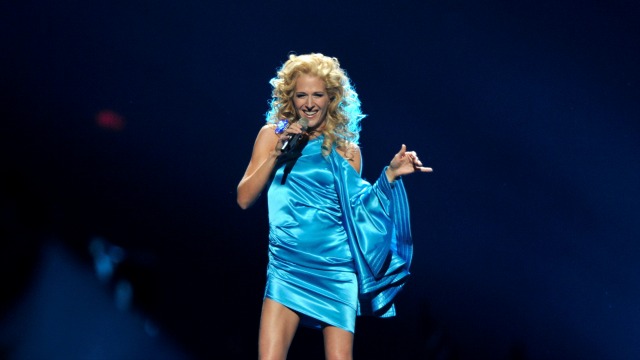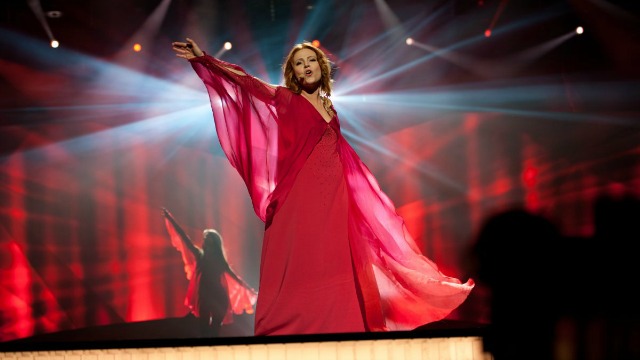Like any niche interest subculture, the Eurovision Song Contest fan community has developed a distinct linguistic shorthand, based on six decades worth of references and in-jokes that would likely prove impenetrable to an outsider. For the most part this is a rather sweet communal bonding exercise that underlines the depth of affection we all share for The Contest.
However, there’s one term that’s routinely thrown around in the press conference that gives me anything but cool vibes. Utter the phrase ‘fanwank’ to a casual viewer, and their minds might conjure up alarming images of high-risk sexual athletics, but in Contest terms it’s become the go-to term to denigrate a very specific type of Eurovision Song – and a very specific type of Eurovision fan – in a way that’s less potentially messy but equally regrettable.
The term fanwank is generally used to describe light pop songs, usually in the schlager style, that receive a warm reaction from dyed-in-the-wool Eurovision fans, but are considered unlikely to appeal to a broader audience. Classic examples would include enduring fan favourites such as Hera Björk’s ‘Je Ne Sais Quoi,’ Charlotte Perrelli’s ‘Hero‘ and Kati Wolf’s ‘What About My Dreams?‘ – songs that were widely fancied in the buildup to their respective years, but were ultimately left on the wrong side of the leaderboard when the votes came in.

Kati Wolf’s ‘What About My Dreams’ is widely considered to be a quintessential Eurovision ‘fan favourite’.
Photo: wolf-kati.com
As an analytical tool, I can see the value of employing the ‘fanwank’ trope. However, this year the songs most frequently targeted with the label are Austria’s sweet Francophone throwback Loin D’ici and the cosmic power pop of Moldova’s Falling Stars. While it’s true that the Zoë in particular received a rapturous response at the various preview parties building up to this year’s contest, it’s interesting that neither of these songs has ever been particularly fancied in the betting, and as many fans as Zoë and Lidia have in the press room, you’d be hard pushed to find anyone who thinks they’re in serious contention for a top ten placing on Saturday, let alone a victory.
If anything, the fact that supposedly ordained fan favourites are failing to skew the betting throws the ugly, derogatory undertones of the term into even starker relief. The Eurovision fan community is a broad church, incorporating virtually every point on the spectrums of gender, sexuality and musical preferences. Everyone has their biases and blind spots, but ‘fanwank’ has become synonymous with the musical predilections of gay men – unquestionably a significant demographic, but by no means the only group with a weakness for overrating their favourites.
You could make a convincing argument for the ‘fanwank’ phenomenon as a reaction against the disproportionate visibility of the LGBT demographic within the Eurovision community, but my suspicion is that the reality is more complicated than a simple ‘us versus them’ mentality. Indeed, in my experience gay men are as guilty as anyone of dismissively throwing around the term.

Eurovision entries that are strongly associated with the schlager genre are particularly vulnerable to being dismissed as ‘fanwank’.
Photo: Eurovision.tv
With this in mind, I wonder whether the term might have become a defensive tool to guard against being defined as ‘the wrong kind’ of fan. No matter how culturally dominant it is, mainstream pop music has always faced an uphill struggle to be taken seriously as a legitimate artistic expression. There are few platforms more friendly towards the medium than the Eurovision Song Contest, but I still get the sense that a straightforward schlager confection is somehow considered of lesser value than an equally run-of-the-mill acoustic guitar ballad or heavy rock song, and given pop and disco music’s historical association with gay men, it’s depressingly possible that some fans have such a visceral reaction against these songs due to internalised homophobia or a fear of appearing to live up to a cliche.
Not that I wish to encourage even broader use of such a reductive term, but looking further up the betting odds, I think it’s entirely possible to find songs that are much more deserving of the accusation that they’re being artificially elevated by the gap between public appeal and what hardcore Eurovision fans look for in an entry – regardless of their sexual identity. Ukraine, for example, projects an avant-garde artistry that seasoned pundits love to see, but second in the betting still feels very generous to me for a song that’s so far removed from the usual elements that make up a crowd-pleasing Eurovision winner.

Jamala’s emotionally intense ‘1944’ is highly regarded by many Eurovision pundits, but attracts far less negativity than other ‘fan favourites’.
Photo: Eurovision.tv
With national selection processes that focus strongly on genre diversity and musicality than spectacle and showmanship, Estonias and Italian entries tend to appeal strongly to a demographic that values those qualities over the slick pop music routinely turned out by shows like Melodifestivalen. This is to their credit, but does this really mean that they make for fundamentally superior Eurovision entries? It’s very possible, if not probable, that both Estonia’s slightly dour Play and Austria’s frothy Loin d’ici will both fail to qualify tomorrow, but Juri hasn’t had to contend with nearly as much online negativity as Zoë has.
The confluence of wildly divergent tastes and opinions is one of the great strengths of the Eurovision Song Contest, and it’s inevitable that our reactions to various songs and genres will be coloured by our personal preferences. But as The Contest continues to act as a powerful tool for spreading messages of harmony and acceptance around the globe, as fans we would all do well to think carefully about the language we use to express our views.









